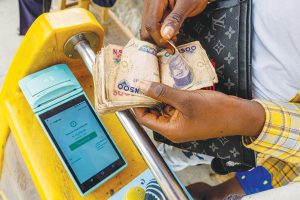A year after launching Africa’s first digital currency, Nigeria’s central bank is turning to the nation’s three-wheeler taxi operators to speed the adoption of the eNaira, as regulators across the world scrutinise its every move.
It’s offering a 5% discount to drivers and passengers of the motorised rickshaws — known locally as Keke Napep — who use the eNaira. It’s the latest attempt to kickstart the digital currency, which has so far attracted just one in 200 people in the continent’s most populous country.
The central bank’s focus on the digital currency is creating confusion among many Nigerians, who fail to see the difference between the government-backed eNaira and cryptocurrencies. For drivers of Keke Napep, the most popular form of transport around the gridlocked streets of Lagos and other cities, the heavy promotion of the eNaira just as authorities crack down on cryptocurrencies has them befuddled. The central bank of Nigeria has barred commercial banks from doing business with crypto exchanges.
When Nigeria became the first African nation to start a central bank digital currency, or CBDC, it was partly targeting the almost 40 million people in the country without a bank account.
The results, so far, have been disappointing. While the eNaira uses similar distributed ledger technology to Bitcoin or Ethereum and can be saved in digital wallets, Nigerians’ passion for cryptocurrencies doesn’t extend to the central bank offering.
Virtual currencies have lured residents of Africa’s top oil producer as a hedge against inflation and currency depreciation, but eNaira is seen as a proxy for the challenges facing the continent’s biggest economy and a symbol of distrust in the ruling elite.
—Bloomberg
 The Gulf Time Newspaper One of the finest business newspapers in the UAE brought to you by our professional writers and editors.
The Gulf Time Newspaper One of the finest business newspapers in the UAE brought to you by our professional writers and editors.
